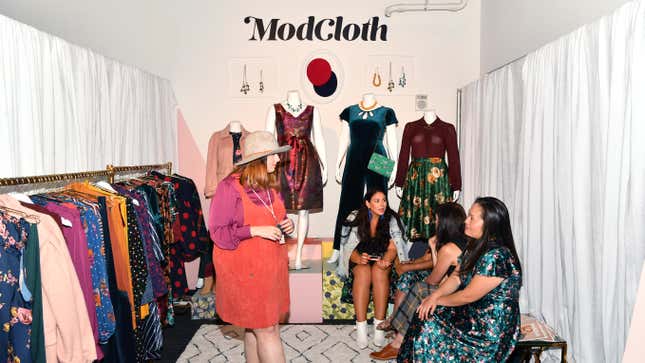Modcloth Employees, Facing Layoffs, Are Caught Between a Big-Box Store and an Investment Firm
Latest
Image: Getty
Modcloth, the upstart online retailer that gained a significant following through the 2000s thanks to its quirky, body-positive vibe, has struggled to maintain the velocity of its early years, changing owners and leadership several times since its founders exited in 2016. In 2017, much to the chagrin of its indie-minded and loyal fanbase, the company sold to a subsidiary of WalMart. Since then, it’s had a rotating cast of CEOS, and on October 4 announced that the brand had been acquired by an investment firm called “Go Global Retail.”
At the time of the sale, the new owners told The Verge they expected Modcloth would “continue in the same direction as before,” and that customers would be unlikely to see many changes. But early this week, a significant portion of the company’s workers indeed saw some changes as they were pulled into meetings and either offered new positions with Go Global or informed they would be unemployed come a few days before Christmas. A spokesperson for Go Global says the company has retained “the majority” of its workforce in both its San Francisco headquarters and the Pittsburgh office, where the company was founded and its warehouse is located: Two employees in the latter say they’ve heard headcount could be reduced by about 30 percent.
Employees who joined an offbeat and intimate company several years ago now find themselves caught, ironically, between Walmart HR and Go Global, an investment firm backed in large part by Asian manufacturers. The laid-off employees Jezebel spoke to had largely been with the company for several years: they spoke to us on the condition of anonymity, as some were still negotiating their exit packages, and others feared retribution during an uncertain time.
In one case, a worker who had been with Modcloth for a decade was initially offered a position in the new company, which he accepted, forfeiting any chance of severance based on his tenure. He was unceremoniously fired the very next day. “They treated us like fucking children,” he says. “Modcloth has taken advantage of its workers.” (Go Global referred us to Walmart on that issue; a spokesperson for Walmart says, “As part of this transaction, the go-forward strategy and employment plans are all being made by the buyer.”)
-

-

-

-

-

-

-

-

-

-

-

-

-

-

-

-

-

-

-

-

-

-

-

-

-

-

-

-

-

-

-

-

-

-

-

-

-

-

-

-








































